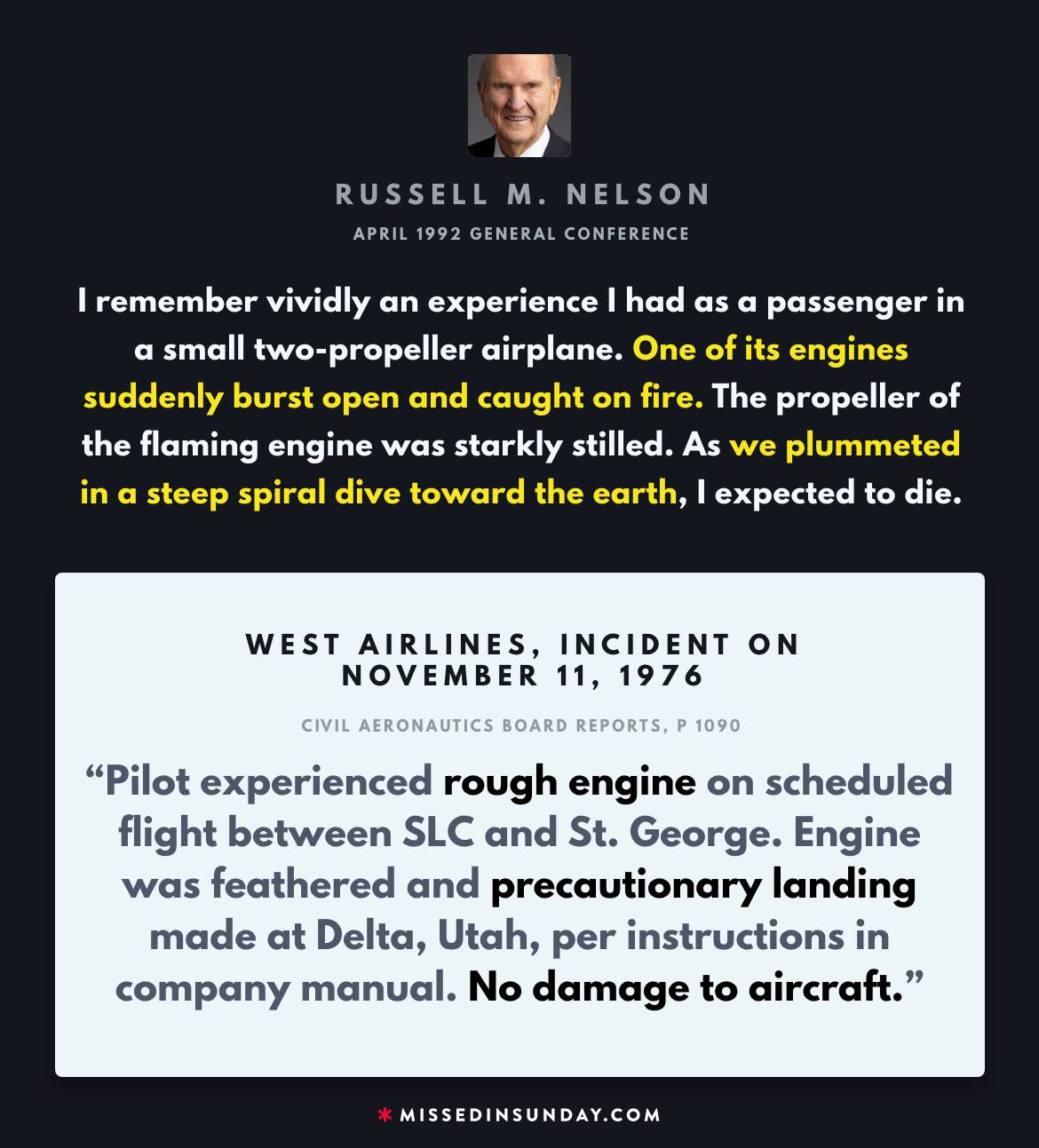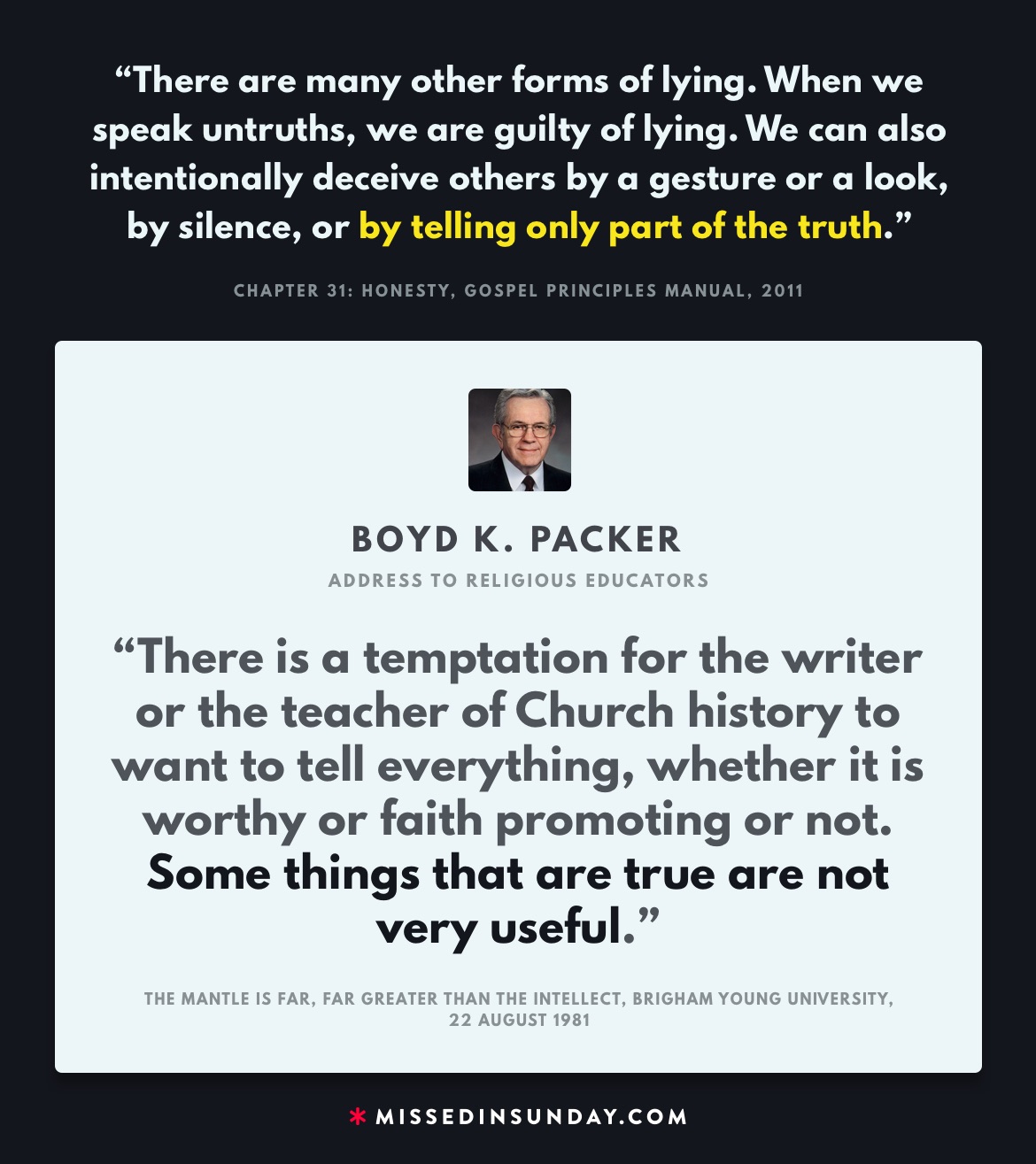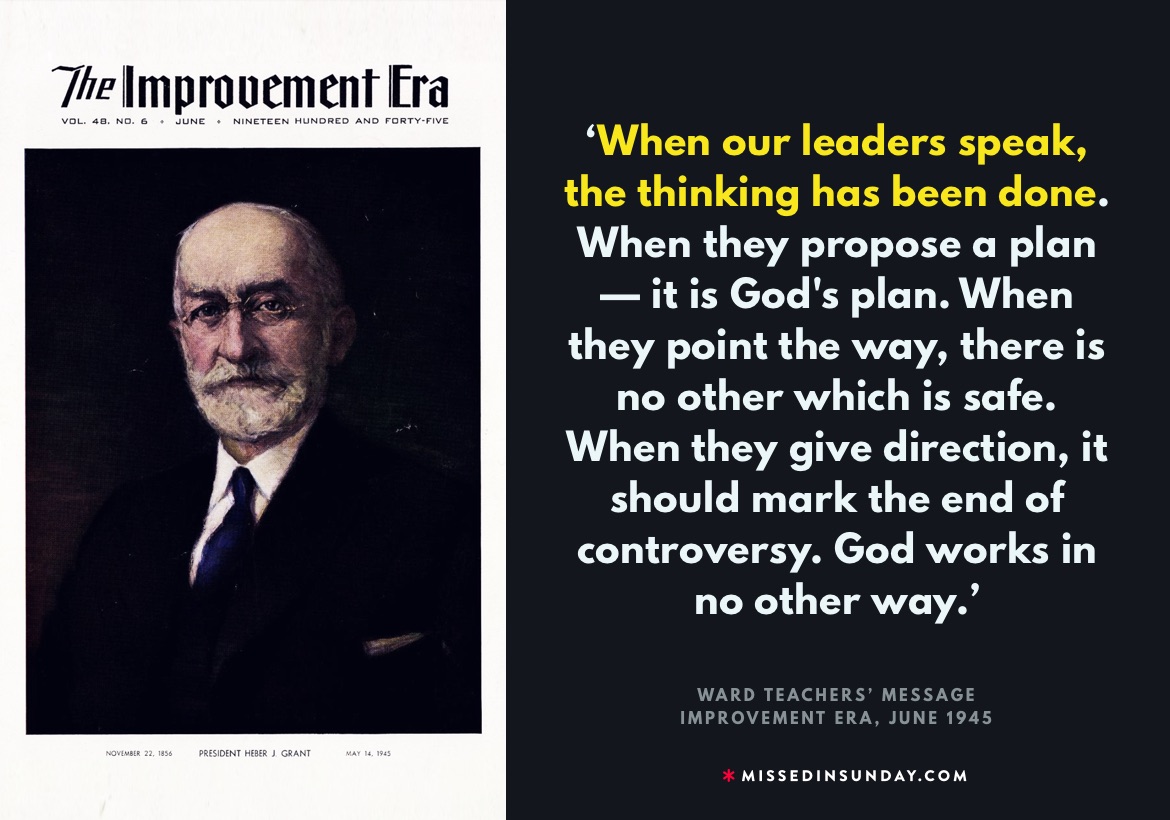The COVID-19 pandemic has certainly been a global stress test! The test has shown mixed results. Safe and effective vaccines have been developed. Medical professionals, teachers, caregivers, and others have sacrifices heroically–and continue to do so.
Apostle Dale G. Renlund
October 2021 General Conference
https://www.churchofjesuschrist.org/study/general-conference/2021/10/43renlund?lang=eng
Category: Other
Other
-
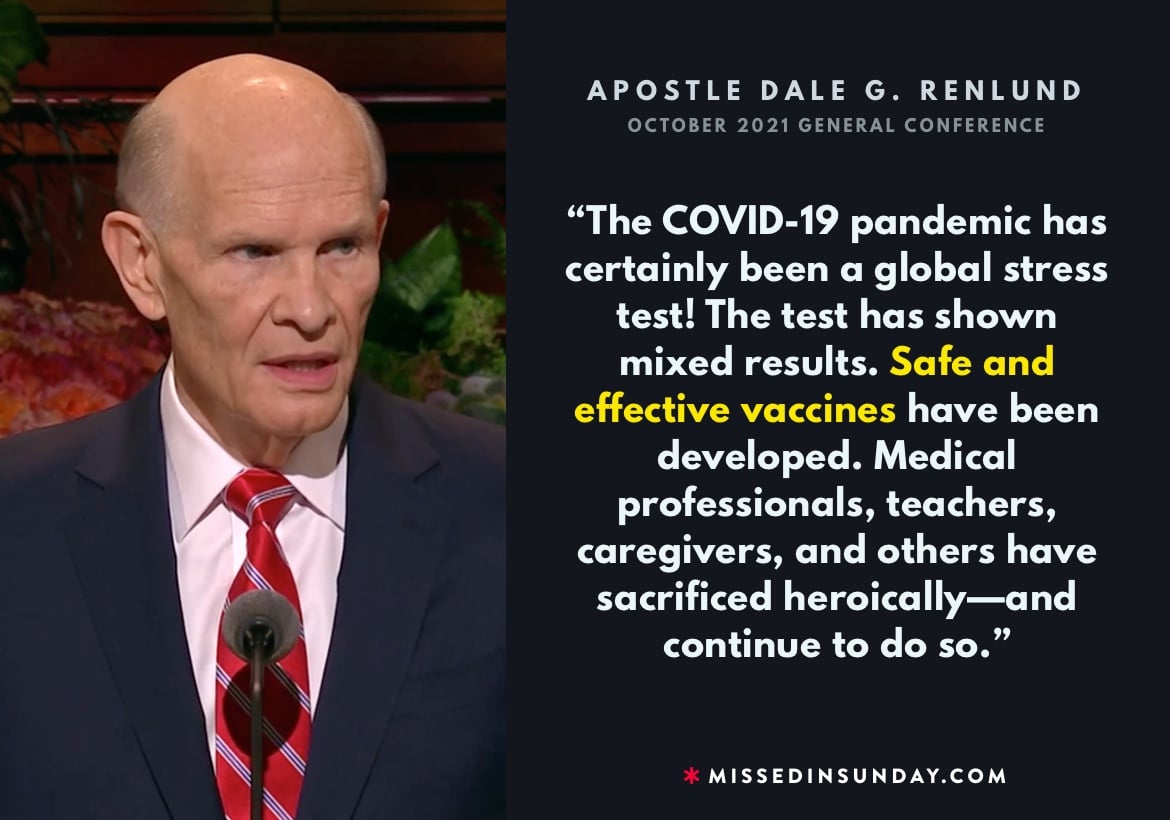
Vaccines Safe and Effective
-
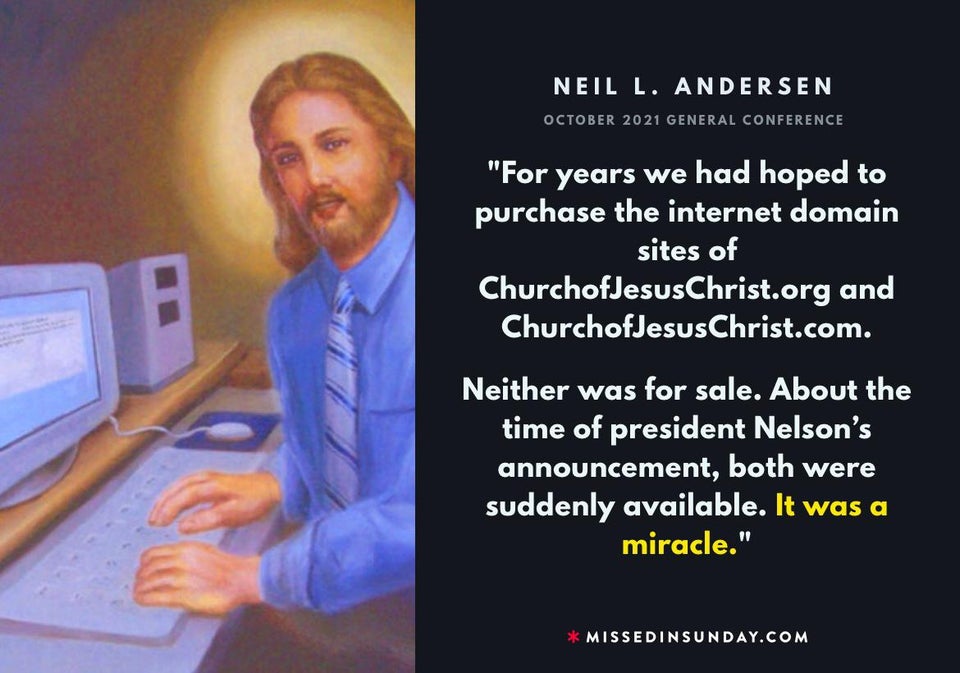
Internet Domain Miracle
For years we had hoped to purchase the internet domain sites ChurchofJesusChrist.org and ChurchofJesusChrist.com. Neither was for sale. About the time of President Nelson’s announcement, both were suddenly available. It was a miracle.
Neil L. Andersen
October 2021 General Conference
https://www.churchofjesuschrist.org/study/general-conference/2021/10/58andersen?lang=eng -

Make money
Excerpt from a testimony by Lucy Harris, wife of Martin Harris, Mormonism Unveiled, pub. 1834: 1
Palmyra, Nov. 29, 1833
Being called upon to give a statement to the world of what I know respecting the (Gold Bible–speculation, and also or the conduct of Martin Harris, my husband, who is a leading character among the Mormons, I do it free from prejudice realizing that I must give an account at the bar of God for what I say. Martin Harris was once industrious attentive to his domestic concerns, and thought to be worth about ten thousand dollars. He is naturally quick in his temper and in his mad–fits frequently abuses all who may dare to oppose him in his wishes. However strange it may seem, I have been a great sufferer by his unreasonable conduct. At different times while I lived with him, he has whipped, kicked, and turned me out of the house. About a year previous to the report being raised that Smith had found gold plates, he became very intimate with the Smith family, and said he believed Joseph could see in his stone any thing he wished. After this he apparently became very sanguine in his belief, and frequently said he would have no one in his house that did not believe in Mormonism, and because I would not give credit to the report he made about the gold plates, he became more austere towards me. In one of his fits of rage he struck me with the but end or a whip, which I think had been used for driving oxen, and was about the size or my thumb, and three or four feet long. He beat me on the head four or five times, and the next day turned me out of doors twice, and beat me in a shameful manner. The next day I went to the town or Marion, and while there my flesh was black and blue in many places. His main complaint against me was, that I was always trying to hinder his making money.
When he found out that I was going to Mr. Putnam’s, in Marion, he said he was going too, that they had sent for him to pay them a visit. On arriving at Mr. Putnam’s, I asked them if they had sent for Mr. Harris; they replied, they knew nothing about it; he, however, came in the evening. Mrs. Putnam told him never to strike or abuse me any more; he then denied ever striking me; she was however convinced that he lied, as the marks of his beating me were plain to be seen, and remained more than two weeks. Whether the Mormon religion be true or false, I leave the world to judge, for its effects upon Martin Harris have been to make him more cross, turbulent and abusive to me. His whole object was to make money by it. I will have one circumstance in proof of it. One day, while at Peter Harris house, I told him he had better leave the company of the Smiths, as their religion was false; to which he replied, if you would let me alone, I could make money by it.
It is in vain for the Mormons to deny these facts; for they are all well known to most of his former neighbors. The man has now become rather an object of pity; he has spent most of his property, and lost the confidence of his former friends. If he had labored as hard on his farm as he has to make Mormons, he might now be one of the wealthiest farmers in the country. He now spends his time in traveling through the country spreading the delusion of Mormonism, and has no regard whatever for his family.
With regard to Mr. Harris being intimate with Mrs. Haggard, as has been reported, it is but justice to myself to state what facts have come within my own observation, to show whether I had any grounds for jealousy or not. Mr. Harris was very intimate with this family, for some time previous to their going to Ohio. They lived a while in a house which he had built for their accommodation, and here he spent the most of his leisure hours ; and made her presents of articles from the store and house. He carried these presents in a private manner, and frequently when he went there, he would pretend to be going to some of the neighbors, on an errand, or to be going into the fields. After getting out of sight of the house, he would steer a straight course for Haggard’s house, especially if Haggard was from home. At times when Haggard was from home, he would go there in the manner above described, and stay till twelve or one o’clock at night, and sometimes until day light.
If his intentions were evil, the Lord will judge him accordingly but if good, he did not mean to let his left hand, know what his right hand did. The above statement or facts, I affirm to be true.
References
References 1 Mormonism Unveiled, pub. 1834 – https://archive.org/details/mormonismunvaile00howe -
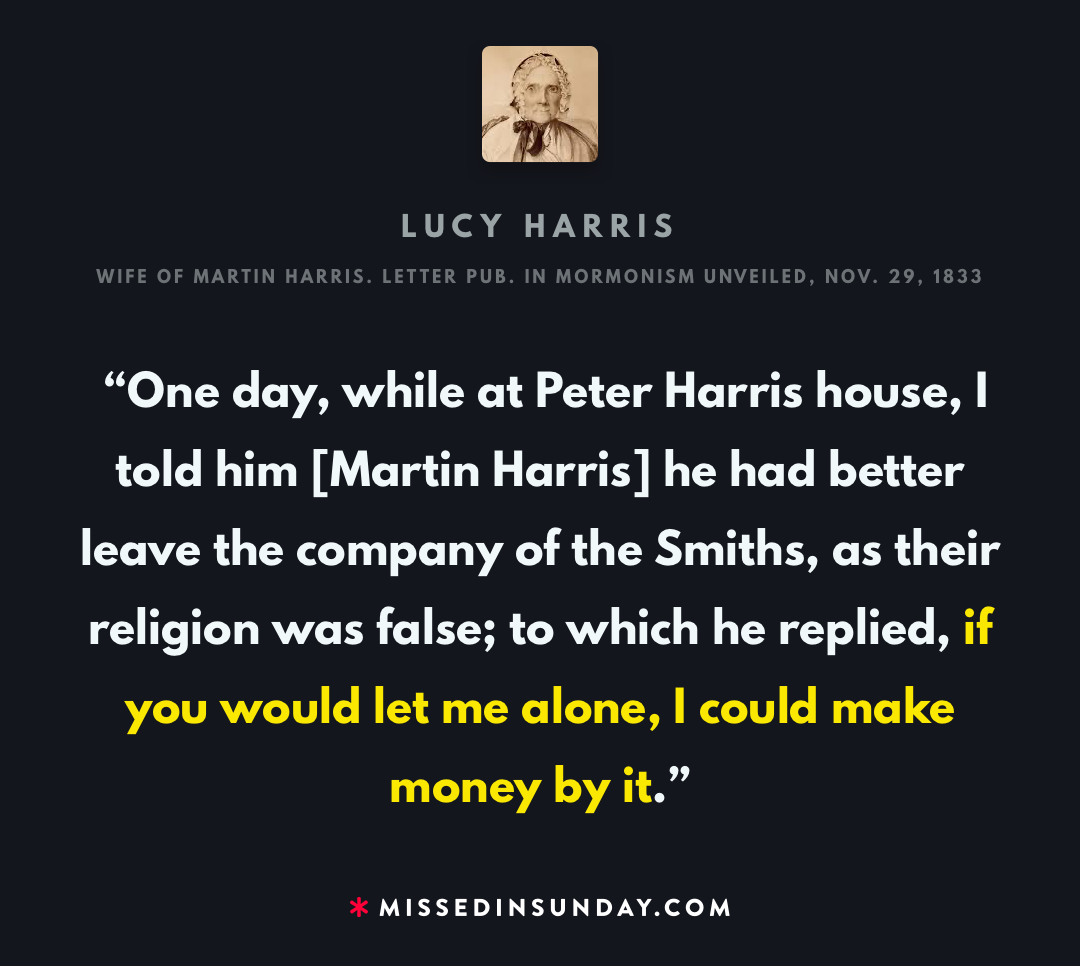
A Whip
Excerpt from a testimony by Lucy Harris, wife of Martin Harris, Mormonism Unveiled, pub. 1834: 1
Palmyra, Nov. 29, 1833
Being called upon to give a statement to the world of what I know respecting the (Gold Bible–speculation, and also or the conduct of Martin Harris, my husband, who is a leading character among the Mormons, I do it free from prejudice realizing that I must give an account at the bar of God for what I say. Martin Harris was once industrious attentive to his domestic concerns, and thought to be worth about ten thousand dollars. He is naturally quick in his temper and in his mad–fits frequently abuses all who may dare to oppose him in his wishes. However strange it may seem, I have been a great sufferer by his unreasonable conduct. At different times while I lived with him, he has whipped, kicked, and turned me out of the house. About a year previous to the report being raised that Smith had found gold plates, he became very intimate with the Smith family, and said he believed Joseph could see in his stone any thing he wished. After this he apparently became very sanguine in his belief, and frequently said he would have no one in his house that did not believe in Mormonism, and because I would not give credit to the report he made about the gold plates, he became more austere towards me. In one of his fits of rage he struck me with the but end or a whip, which I think had been used for driving oxen, and was about the size or my thumb, and three or four feet long. He beat me on the head four or five times, and the next day turned me out of doors twice, and beat me in a shameful manner. The next day I went to the town or Marion, and while there my flesh was black and blue in many places. His main complaint against me was, that I was always trying to hinder his making money.
When he found out that I was going to Mr. Putnam’s, in Marion, he said he was going too, that they had sent for him to pay them a visit. On arriving at Mr. Putnam’s, I asked them if they had sent for Mr. Harris; they replied, they knew nothing about it; he, however, came in the evening. Mrs. Putnam told him never to strike or abuse me any more; he then denied ever striking me; she was however convinced that he lied, as the marks of his beating me were plain to be seen, and remained more than two weeks. Whether the Mormon religion be true or false, I leave the world to judge, for its effects upon Martin Harris have been to make him more cross, turbulent and abusive to me. His whole object was to make money by it. I will have one circumstance in proof of it. One day, while at Peter Harris house, I told him he had better leave the company of the Smiths, as their religion was false; to which he replied, if you would let me alone, I could make money by it.
It is in vain for the Mormons to deny these facts; for they are all well known to most of his former neighbors. The man has now become rather an object of pity; he has spent most of his property, and lost the confidence of his former friends. If he had labored as hard on his farm as he has to make Mormons, he might now be one of the wealthiest farmers in the country. He now spends his time in traveling through the country spreading the delusion of Mormonism, and has no regard whatever for his family.
With regard to Mr. Harris being intimate with Mrs. Haggard, as has been reported, it is but justice to myself to state what facts have come within my own observation, to show whether I had any grounds for jealousy or not. Mr. Harris was very intimate with this family, for some time previous to their going to Ohio. They lived a while in a house which he had built for their accommodation, and here he spent the most of his leisure hours ; and made her presents of articles from the store and house. He carried these presents in a private manner, and frequently when he went there, he would pretend to be going to some of the neighbors, on an errand, or to be going into the fields. After getting out of sight of the house, he would steer a straight course for Haggard’s house, especially if Haggard was from home. At times when Haggard was from home, he would go there in the manner above described, and stay till twelve or one o’clock at night, and sometimes until day light.
If his intentions were evil, the Lord will judge him accordingly but if good, he did not mean to let his left hand, know what his right hand did. The above statement or facts, I affirm to be true.
References
References 1 Mormonism Unveiled, pub. 1834 – https://archive.org/details/mormonismunvaile00howe -

Qualifications
Excerpt from an address by David O. McKay given in the April 1950 General Conference: 1
Qualifications and calling of missionaries
The physically handicapped. Again there is the problem of the physically handicapped; of course you would like them to go, but think how they would interfere with their companions. Elders should go two by two, and so should sisters, and no one of them should be hampered in his or her activity with somebody who is not equal to the responsibilities of missionary work.
References
References 1 April 1950 General Conference – https://archive.org/details/conferencereport1950a -

Out of Wedlock
Excerpt from an April 1930 General Conference talk by Sylvester Q. Cannon: 1
BENEFITS OF HIGH MORAL STANDARDS
Now what are the evidences as to the benefits of the observance by the Latter-day Saints of high moral standards as compared with other people ? I would like to take the opportunity to give you certain government statistics. The Church does not keep record of births out of wedlock, but the government records for Utah and Idaho, where the majority of the Latter-day Saints live, as compared with the rest of the United States, show that the illegitimate birth rate in each of these two states is less than one-third. And that is true also of still-births out of wedlock. Is that any evidence to you as to the benefits of the observance of the declarations of God and the teachings by the leaders
References
References 1 April 1930 General Conference – https://archive.org/details/conferencereport1930a -
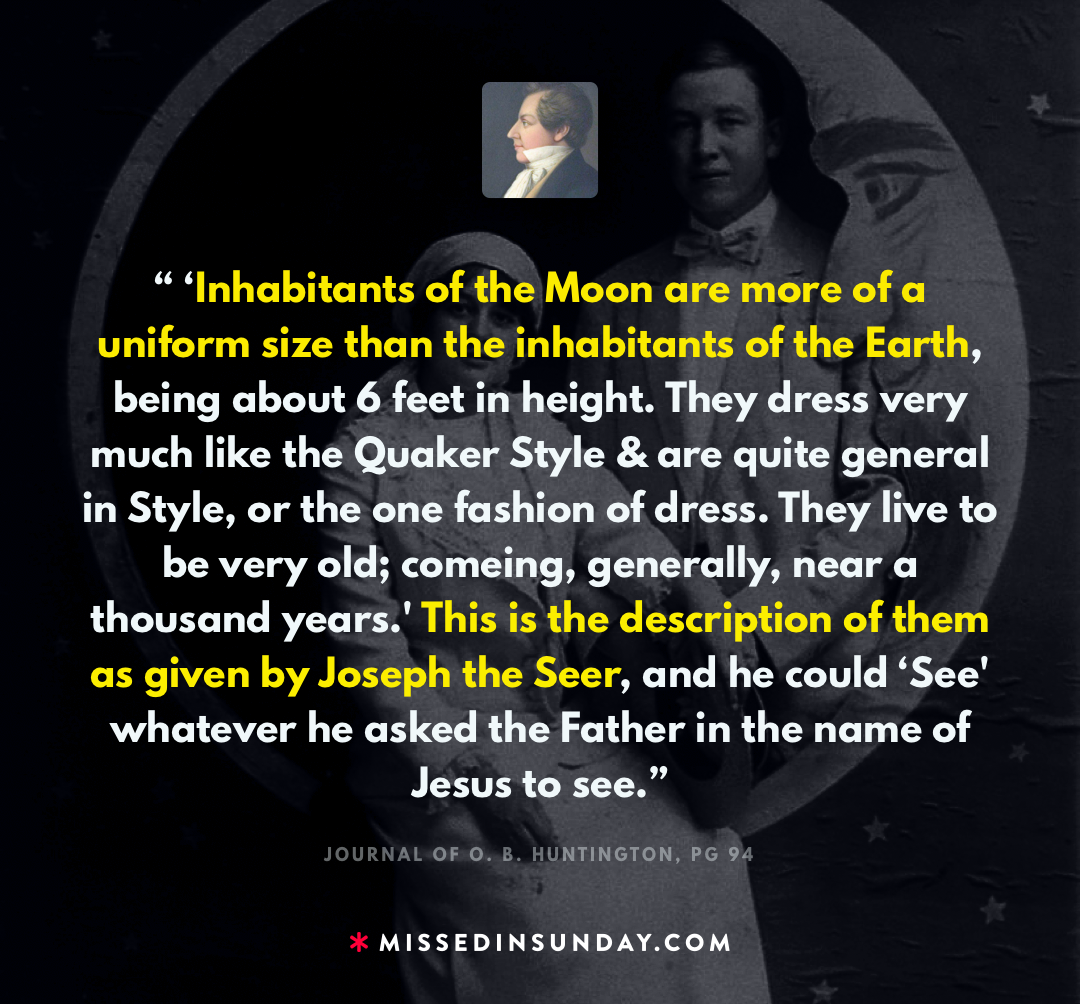
Moon Men
Excerpt from the journal of O. B. Huntington, pg 94, 1881:1
“ ‘Inhabitants of the Moon are more of a uniform size than the inhabitants of the Earth, being about 6 feet in height. They dress very much like the Quaker Style & are quite general in Style, or the one fashion of dress. They live to be very old; comeing, generally, near a thousand years.’ This is the description of them as given by Joseph the Seer, and he could ‘See’ whatever he asked the Father in the name of Jesus to see.”
References
References 1 Journal of O. B. Huntington, pg 94 – https://contentdm.lib.byu.edu/digital/collection/SCMisc/id/27480 -
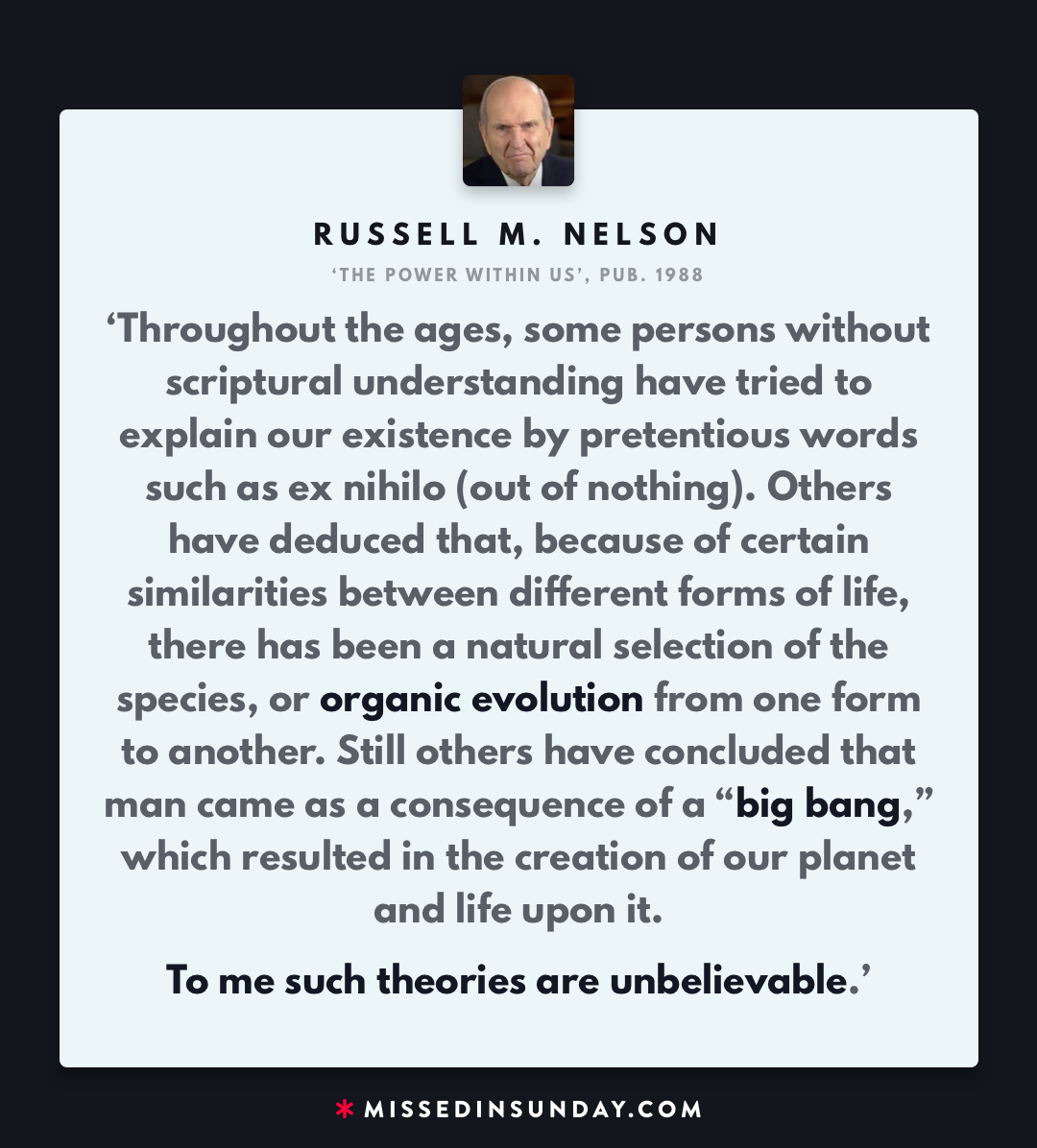
Evolution
Excerpt from The Power Within Us by Russell M. Nelson, Pub. 1988: 1
Our Divine Creation
Thoughts of life, death, and resurrection bring us to face crucial questions. How were we made? By whom? And why?
Throughout the ages, some persons without scriptural understanding have tried to explain our existence by pretentious words such as ex nihilo (out of nothing). Others have deduced that, because of certain similarities between different forms of life, there has been a natural selection of the species, or organic evolution from one form to another. Still others have concluded that man came as a consequence of a “Big Bang,” which resulted in the creation of our planet and life upon it.
To me such theories are unbelievable.
References
References 1 The Power Within Us by Russell M. Nelson, Pub. 1988 – https://deseretbook.com/p/power-within-us-russell-m-nelson-2791 -
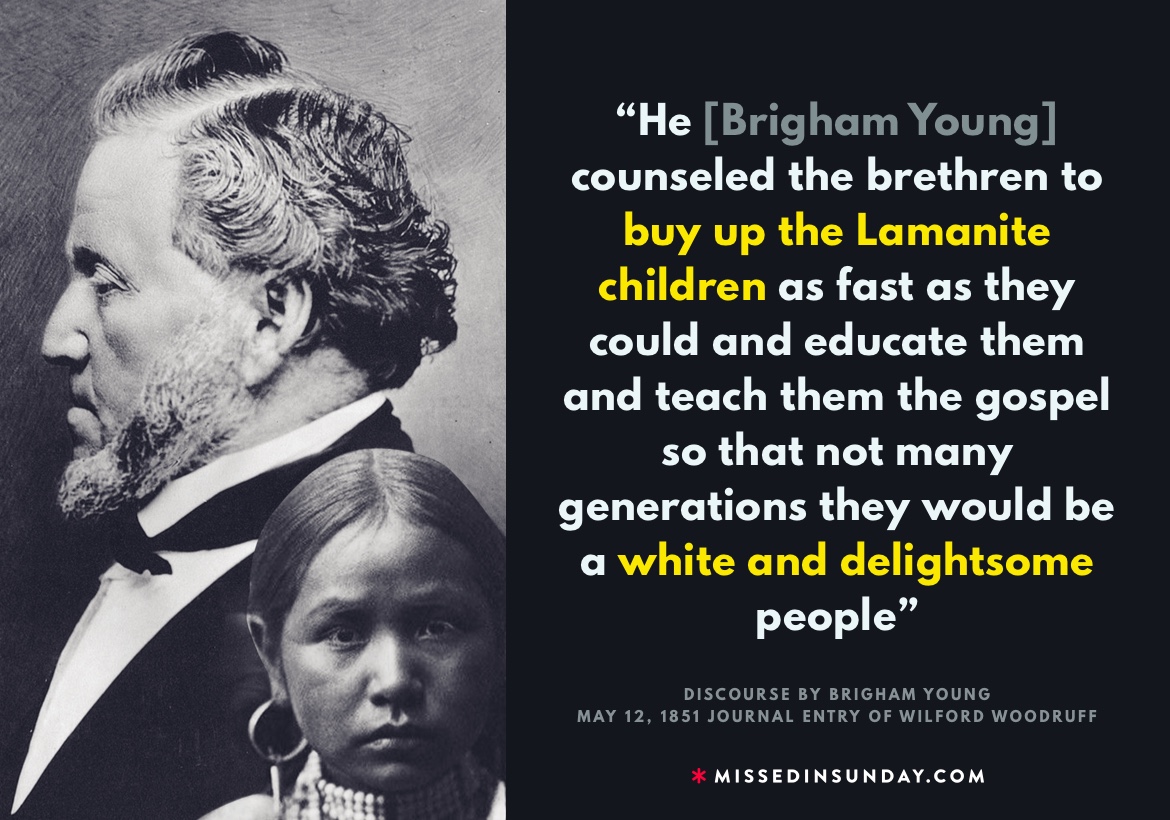
Buy up the Children
Excerpt from the journal of Wilford Woodruff: 1
May 12, 1851: At Cedar City, President Young then addressed them and said he would express his feelings upon the subject to those who wished to go home. If you were now on a mission to France, England or any other part of the earth preaching the gospel, you would not sit down and counsel together about going to get your families or go home until your mission was ended. This is of quite as much importance as preaching the gospel. for the time has now come when it is required of us to make the wilderness blossom as the rose. Our mission now is building up stakes of Zion and filling these mountains with cities and when your mission is ended, you are at liberty to go and be free and only do right. When I go on a mission, I leave my affairs in the hands of God. If my house, fields, flocks, wife or children die in my absence, I say Amen to it. If they live and prosper, I feel to say Amen to it and thank the Lord. He wished the brethren to finish the fort and secure their grain and wished the land to be surveyed so that the brethren who laid the foundation could have their choice of farms. He counselled the brethren to buy up the Lamanite children as fast as they could and educate them and teach them the gospel so that not many generations they would be a white and delightsome people for the Lord could not have devised a better plan than to have put us where we are in order to accomplish this thing.
References
References 1 Journal of Wilford Woodruff – https://archive.org/details/WoodruffWilfordJournalSelections -
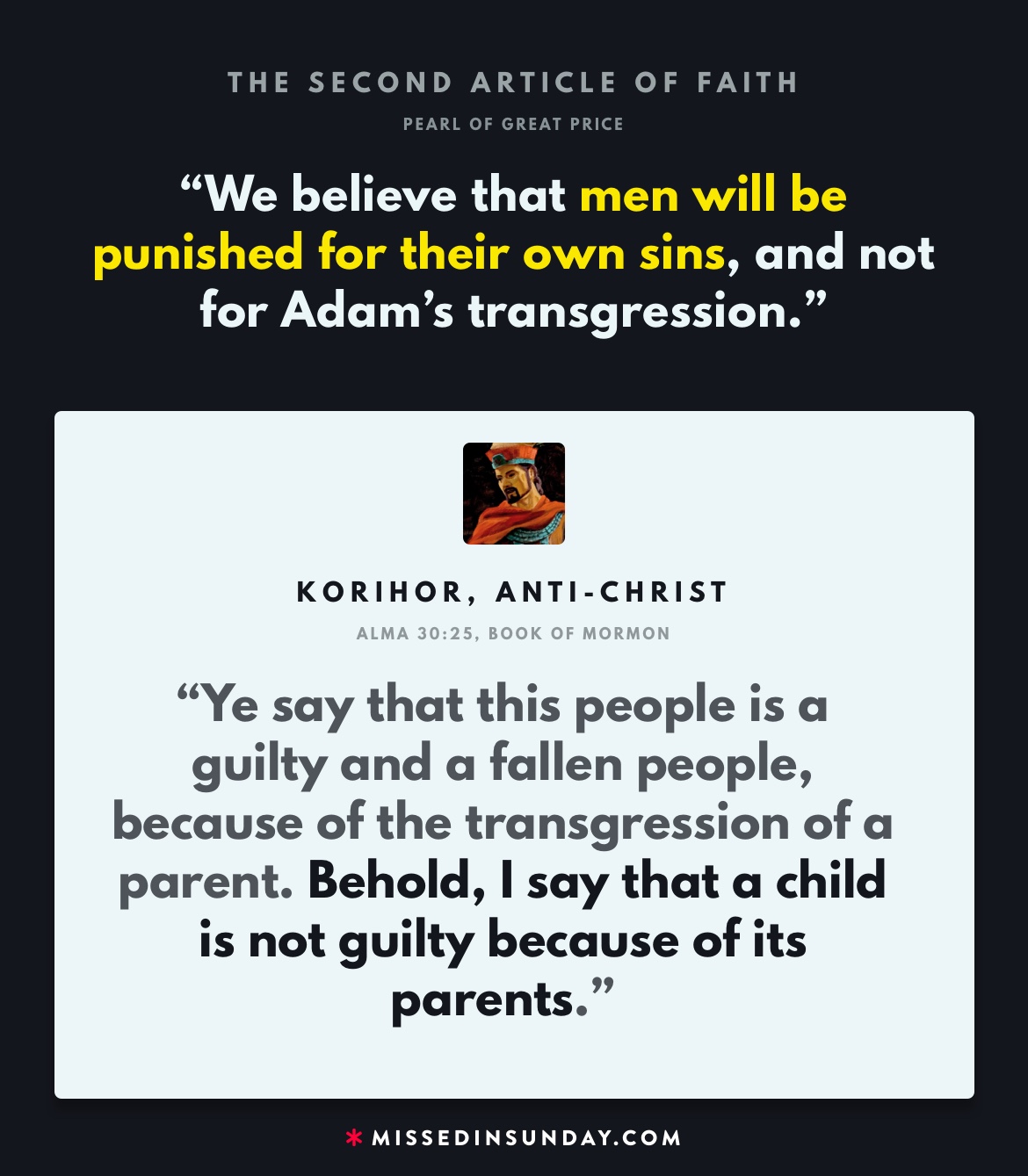
Korihor
Alma 30:25, The Book of Mormon: 1
25 Ye say that this people is a guilty and a fallen people, because of the transgression of a parent. Behold, I say that a child is not guilty because of its parents.
The Second Article of Faith: 2
2 We believe that men will be punished for their own sins, and not for Adam’s transgression.
References
References 1 Alma 30:25, The Book of Mormon – https://www.churchofjesuschrist.org/study/scriptures/bofm/alma/30?lang=eng 2 The Second Article of Faith – https://www.churchofjesuschrist.org/study/scriptures/pgp/a-of-f/1?lang=eng -
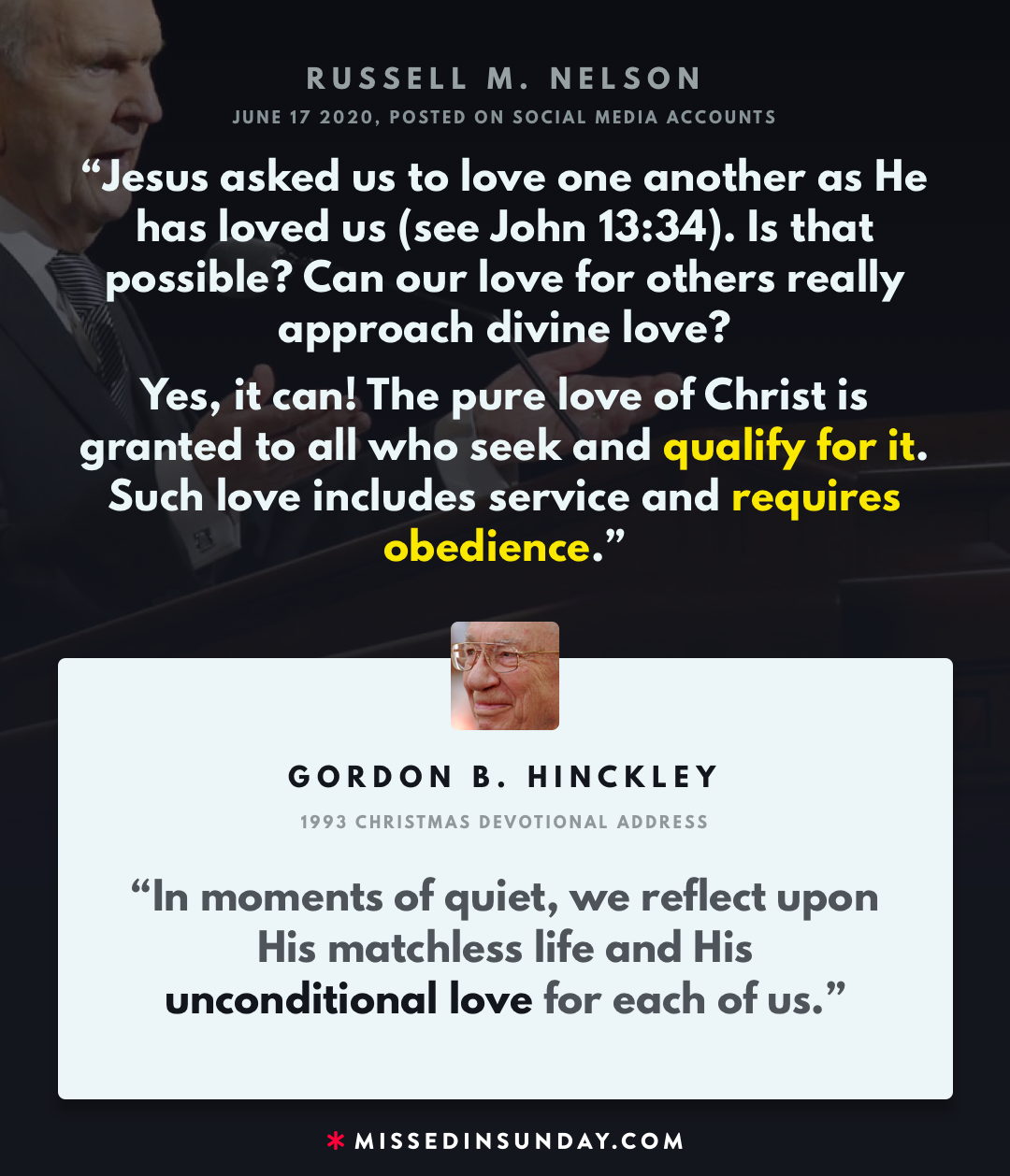
Unconditional
Excerpt from a 1993 Christmas Devotional address by Gordon B. Hinckley: 1
“And so at this Christmas season we reach out to all in a spirit of love and reconciliation, even to those who speak evil against us. We sing beautiful carols that tell of the night of His birth, that silent and holy night. In moments of quiet, we reflect upon His matchle
A June 17, 2020 social media post by Russell M. Nelson 2
Jesus asked us to love one another as He has loved us (see John 13:34). Is that possible? Can our love for others really approach divine love? Yes, it can! The pure love of Christ is granted to all who seek and qualify for it. Such love includes service and requires obedience.
References
References 1 December 11, 1993, Christmas Devotional – http://www.ldschurchnewsarchive.com/articles/23911/Devotional-focuses-on-the-Savior.html 2 June 17, 2020 social media post by Russell M. Nelson – https://twitter.com/NelsonRussellM/status/1273315032634277889 -

Evil with evil
Social media post from Russell M. Nelson, June 1 2020: 1
We join with many throughout this nation and around the world who are deeply saddened at recent evidences of racism and a blatant disregard for human life. We abhor the reality that some would deny others respect and the most basic of freedoms because of the color of his or her skin.
We are also saddened when these assaults on human dignity lead to escalating violence and unrest.The Creator of us all calls on each of us to abandon attitudes of prejudice against any group of God’s children. Any of us who has prejudice toward another race needs to repent!
During the Savior’s earthly mission, He constantly ministered to those who were excluded, marginalized, judged, overlooked, abused, and discounted. As His followers, can we do anything less? The answer is no! We believe in freedom, kindness, and fairness for all of God’s children!
Let us be clear. We are brothers and sisters, each of us the child of a loving Father in Heaven. His Son, the Lord Jesus Christ, invites all to come unto Him—“black and white, bond and free, male and female,” (2 Nephi 26:33). It behooves each of us to do whatever we can in our spheres of influence to preserve the dignity and respect every son and daughter of God deserves.
Any nation can only be as great as its people. That requires citizens to cultivate a moral compass that helps them distinguish between right and wrong.
Illegal acts such as looting, defacing, or destroying public or private property cannot be tolerated. Never has one wrong been corrected by a second wrong. Evil has never been resolved by more evil.
We need to foster our faith in the Fatherhood of God and the brotherhood of man.
We need to foster a fundamental respect for the human dignity of every human soul, regardless of their color, creed, or cause.
And we need to work tirelessly to build bridges of understanding rather than creating walls of segregation.
I plead with us to work together for peace, for mutual respect, and for an outpouring of love for all of God’s children.
:::
From the History of the Church, Volume 6: 2
To the Marshal of said City, greeting.
You are here commanded to destroy the printing press from whence issues the Nauvoo Expositor, and pi the type of said printing establishment in the street, and burn all the Expositors and libelous handbills found in said establishment; and if resistance be offered to your execution of this order by the owners or others, demolish the house; and if anyone threatens you or the Mayor or the officers of the city, arrest those who threaten you, and fail not to execute this order without delay, and make due return hereon.
By order of the City Council,
Joseph Smith, Mayor.
References
References 1 ‘President Nelson Shares Social Post about Racism and Calls for Respect for Human Dignity’, Church Newsroom – https://newsroom.churchofjesuschrist.org/article/president-nelson-shares-social-post-encouraging-understanding-and-civility 2 Manuscript History of the Church, Volume 6 Chapter 21 – http://www.josephsmithpapers.org/transcript/history-1838-1856-volume-f-1-1-may-1844-8-august-1844?print=true#13355350256554794541 -
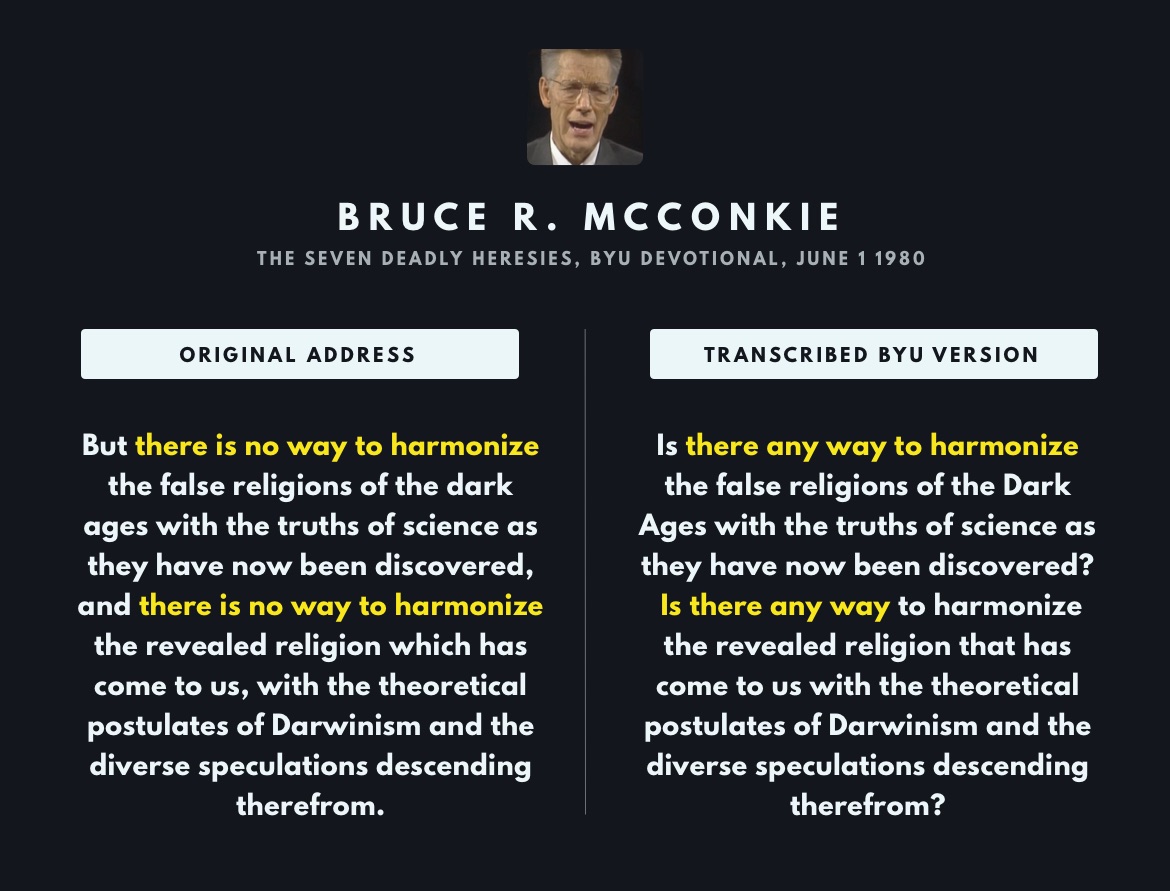
Seven Deadly Heresies
Excerpt from a June 1, 1980 BYU devotional by Apostle Bruce R. McKonkie (original address): 1
Heresy two concerns itself with the relationship between organic evolution and revealed religion and asks the question whether they can be harmonized.
There are those who believe that the theory of organic evolution runs counter to the plain and explicit principles set forth in the holy scriptures as these have been interpreted and taught by Joseph Smith and his associates. There are others who think that evolution is the system used by the Lord to form plant and animal life and to place man on earth.
May I say that all truth is in agreement, that true religion and true science bear the same witness, and that in the true and full sense, true science is part of true religion. But may I also raise some questions of a serious nature. Is there any way to harmonize the false religions of the Dark Ages with the truths of science as they have now been discovered? Is there any way to harmonize the revealed religion that has come to us with the theoretical postulates of Darwinism and the diverse speculations descending therefrom?
Excerpt from a June 1, 1980 BYU devotional by Apostle Bruce R. McKonkie (transcribed version): 2
Heresy two. There are those who say that revealed religion and organic evolution can be harmonized. This is both false and devilish. Yes, all truth is in agreement and true religion and true science bear the same witness. Indeed in the true and full sense, true science is part of true religion. But there is no way to harmonize the false religions of the dark ages with the truths of science as they have now been discovered, and there is no way to harmonize the revealed religion which has come to us, with the theoretical postulates of Darwinism and the diverse speculations descending therefrom.
References
References 1, 2 June 1, 1980 BYU devotional by Apostle Bruce R. McKonkie – https://speeches.byu.edu/talks/bruce-r-mcconkie/seven-deadly-heresies/ -

No Apostate
From the Atlantic, April 19, 2020: 1
New Zealand’s Prime Minister May Be the Most Effective Leader on the Planet
Jacinda Ardern’s leadership style, focused on empathy, isn’t just resonating with her people; it’s putting the country on track for success against the coronavirus.
Excerpt from an October 1947 General Conference address by Harold B. Lee: 2
I want to bear you my testimony that the experience I have had has taught me that those who criticize the leaders of this Church are showing signs of a spiritual sickness which, unless curbed, will bring about eventually spiritual death. I want to bear my testimony as well that those who in public seek by their criticism, to belittle our leaders or bring them into disrepute, will bring upon themselves more hurt than upon those whom they seek thus to malign. I have watched over the years, and I have read of the history of many of those who fell away from this Church, and I want to bear testimony that no apostate who ever left this Church ever prospered as an influence in his community thereafter.
References
References 1 Atlantic, April 19, 2020 – https://www.theatlantic.com/politics/archive/2020/04/jacinda-ardern-new-zealand-leadership-coronavirus/610237/ 2 October 1947 General Conference address by Harold B. Lee – https://archive.org/details/conferencereport1947sa/mode/2up -
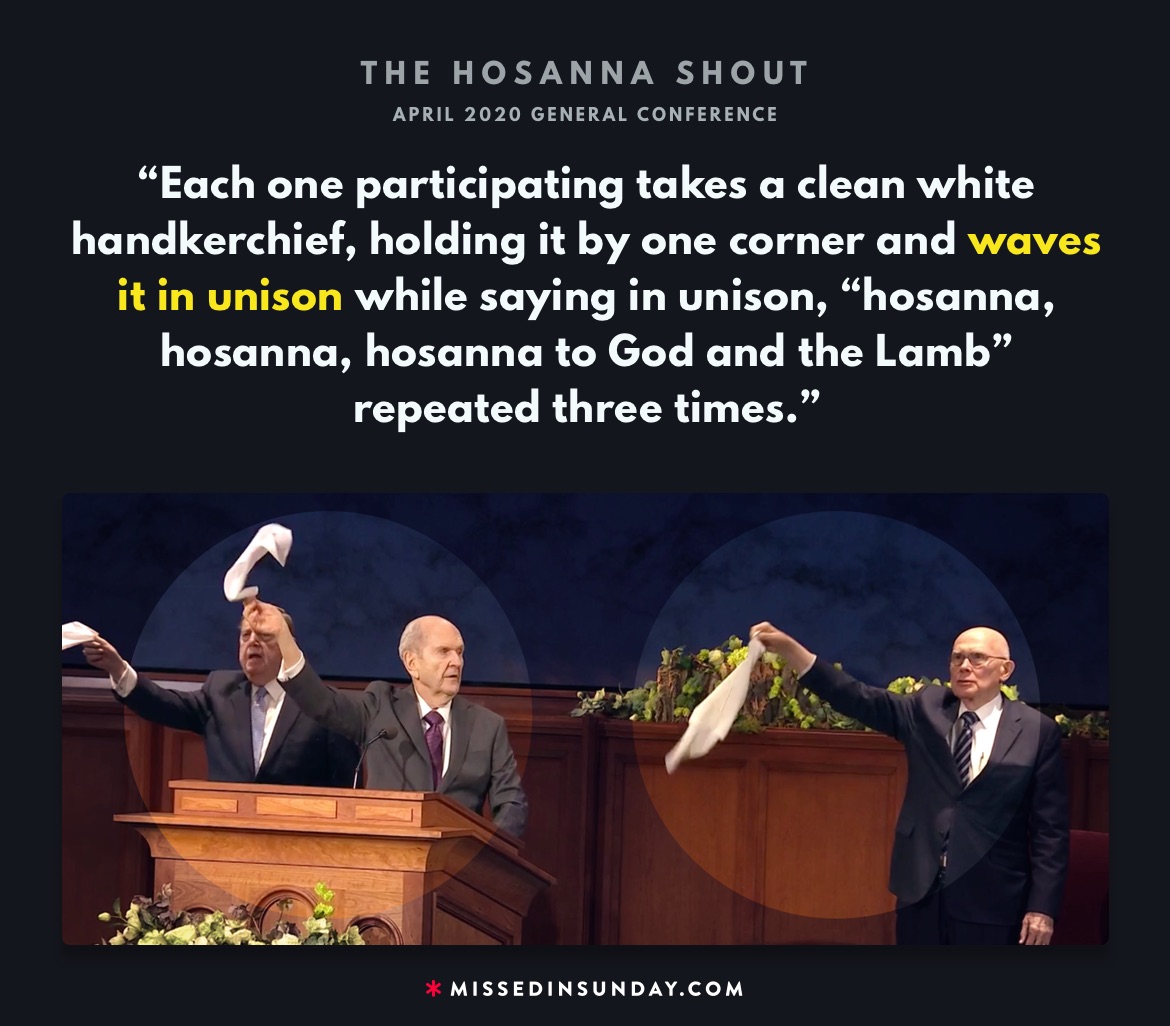
In unison
Excerpt from the April 2020 General Conference ‘Hosanna Shout’ instruction given by Russell M. Nelson: 1
Each one participating takes a clean white handkerchief, holding it by one corner and waves it in unison, while saying in unison, “hosanna, hosanna, hosanna to God and the Lamb” repeated three times followed by “amen, amen and amen”.
References
References 1 April 2020 General Conference ‘Hosanna Shout’ instruction given by Russell M. Nelson – https://www.churchofjesuschrist.org/general-conference/2020/04/media/6147256739001?lang=eng -
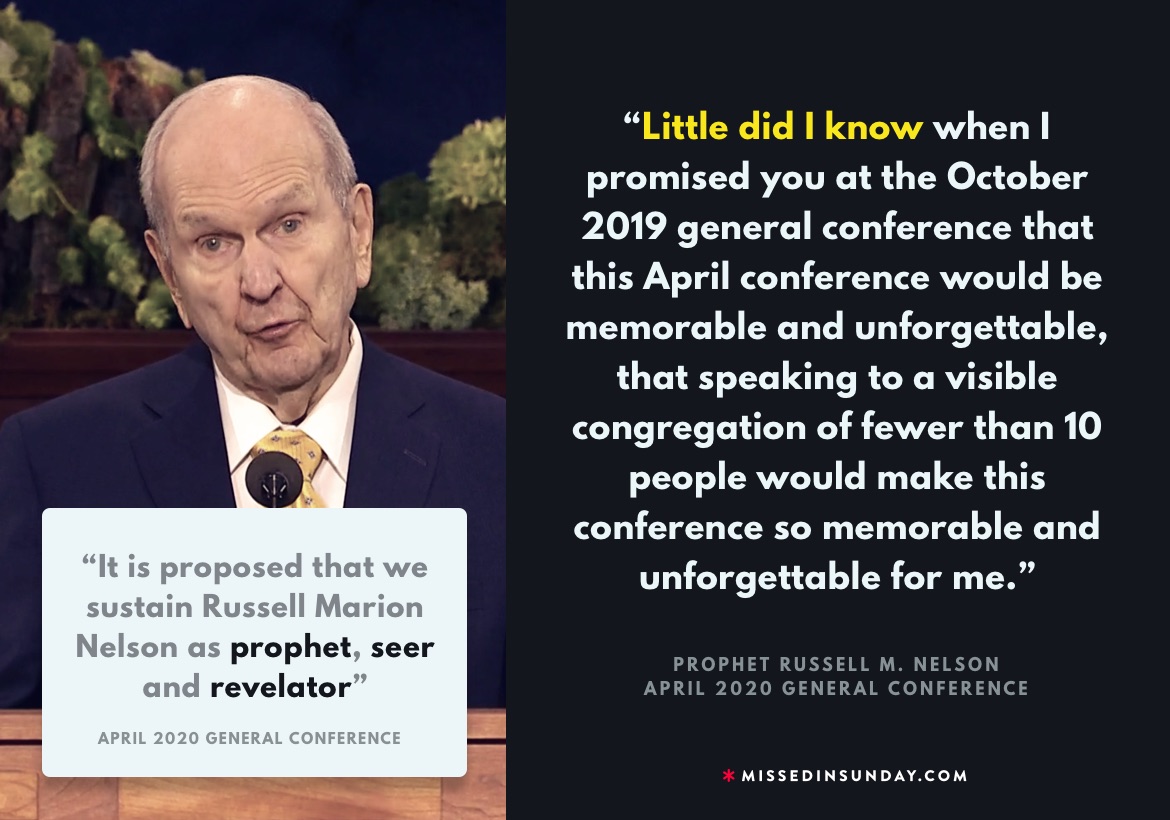
Little did I know
Excerpt from an April 2020 General Conference address by Russell M. Nelson: 1
Little did I know when I promised you at the October 2019 General Conference that this April conference would be memorable and unforgettable—that speaking to a visible congregation of fewer than 10 people would make this conference so memorable and unforgettable for me.
Excerpt from an April 2020 General Conference, sustaining of Church officers: 2
It is proposed that we sustain Russell Marion Nelson as prophet, seer and revelator.
References
References 1 April 2020 General Conference address by Russell M. Nelson – https://www.churchofjesuschrist.org/broadcasts?lang=eng&video=61441943320014Mb9gU6DmKs 2 April 2020 General Conference, sustaining of Church officers – https://www.churchofjesuschrist.org/broadcasts?lang=eng&video=61441943320014Mb9gU6DmKs -

We hear him v3
April 2 2020 instagram Post, Church of Jesus Christ:1
When we hear His servants, we hear Him.
Listen to the words of the Savior at general conference.
From the April 1942 General Conference, prophet Heber J. Grant: 2
“MESSAGE TO THE YOUTH
To the youth of the Church we repeat all the foregoing advice, but above all we plead with you to live clean, for the unclean life leads only to suffering, misery, and woe physically, — and spiritually it is the path to destruction. How glorious and near to the angels is youth that is clean; this youth has joy unspeakable here and eternal happiness hereafter. Sexual purity is youth’s most precious possession; it is the foundation of all righteousness. Better dead, clean, than alive, unclean.
Times approach when we shall need all the health, strength, and spiritual power we can get to bear the afflictions that will come upon us.”
References
References 1 April 2 2020 instagram Post, Church of Jesus Christ – https://www.instagram.com/p/B-ejqIxnKRj/ 2 Message of the First Presidency, Heber J. Grant. April 1942 General Conference – http://scriptures.byu.edu/#:t15:g70 -
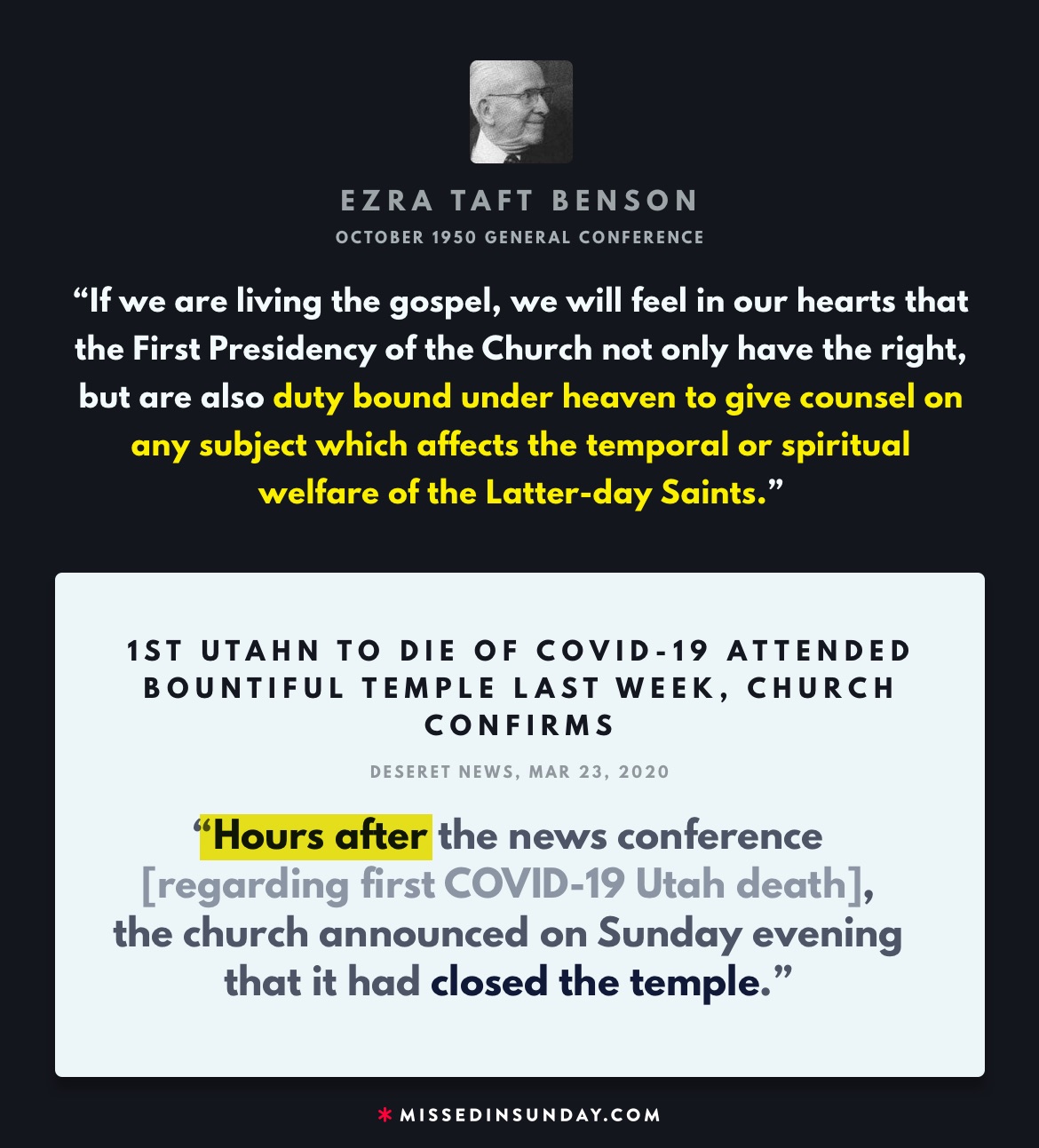
Covid-19
Excerpt from a Mar 23, 2020 Deseret News article, “1st Utahn to die of COVID-19 attended Bountiful temple last week, church confirms”: 1
Utah Department of Health officials announced the Davis County man’s death on Sunday in a news conference. They said he was over the age of 60 and had tested positive for COVID-19 on Saturday. He was treated for two days at Lakeview Hospital in Bountiful before he died.
Hours after the news conference, the church announced on Sunday evening that it had closed the temple. The Bountiful temple was the first of the church’s 17 Utah temples to close due to the pandemic.
Excerpt from an October 1950 General Conference address by Ezra Taft Benson: 2
“If we are living the gospel, we will feel in our hearts that the First Presidency of the Church not only have the right, but are also duty bound under heaven to give counsel on any subject which affects the temporal or spiritual welfare of the Latter-day Saints.”
References
References 1 Mar 23, 2020 Deseret News – https://www.deseret.com/faith/2020/3/23/21191722/mormon-temple-covid-19-coronavirus-utah-death-bountiful-lds-church 2 October 1950 General Conference address by Ezra Taft Benson – https://archive.org/details/conferencereport1950sa/mode/2up -

Thus saith the lord
Excerpt from Church News, 31 July 1954, pg 10. 1
“There are those who insist that unless the Prophet of the Lord declares, ‘Thus saith the Lord,’ the message may not be taken as a revelation. This is a false testing standard. For while many of our modern revelations as contained in the Doctrine and Covenants do contain these words, there are many that do not.”
References
References 1 Reference Doctrine and Covenants Student Manual, Enrichment F: “As If from Mine Own Mouth”: The Role of Prophets in the Church – https://www.churchofjesuschrist.org/manual/doctrine-and-covenants-student-manual/enrichment-f-as-if-from-mine-own-mouth-the-role-of-prophets-in-the-church?lang=eng -
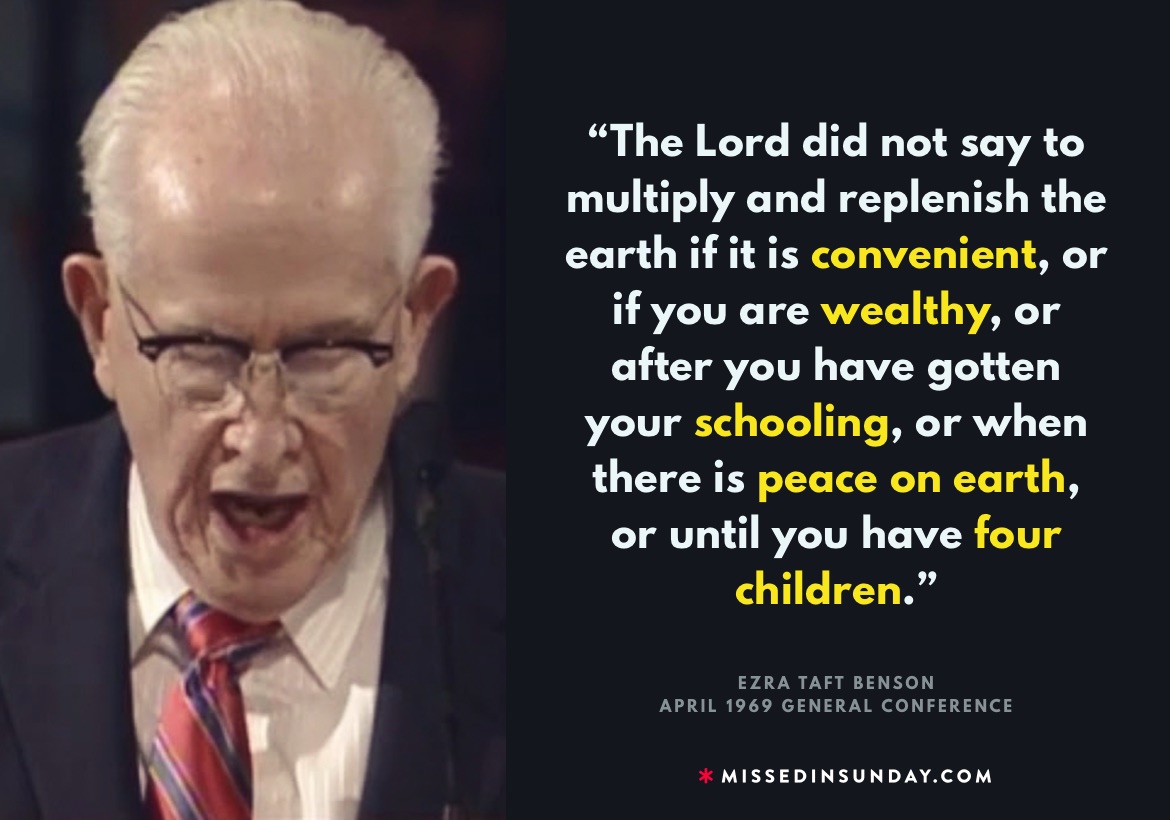
Four Children
Excerpt from an April 1969 General Conference address by Ezra Taft Benson: 1
The world teaches birth control. Tragically, many of our sisters subscribe to its pills and practices when they could easily provide earthly tabernacles for more of our Father’s children. We know that every spirit assigned to this earth will come, whether through us or someone else. There are couples in the Church who think they are getting along just fine with their limited families but who will someday suffer the pains of remorse when they meet the spirits that might have been part of their posterity. The first commandment given to man was to multiply and replenish the earth with children. That commandment has never been altered, modified, or cancelled. The Lord did not say to multiply and replenish the earth if it is convenient, or if you are wealthy, or after you have gotten your schooling, or when there is peace on earth, or until you have four children. The Bible says, “Lo, children are an heritage of the Lord: . . . Happy is the man that hath his quiver full of them. . .” (Ps. 127:3, 5.) We believe God is glorified by having numerous children and a program of perfection for them. So also will God glorify that husband and wife who have a large posterity and who have tried to raise them up in righteousness.
References
References 1 April 1969 General Conference – https://archive.org/details/conferencereport1969a/page/n65/mode/2up -
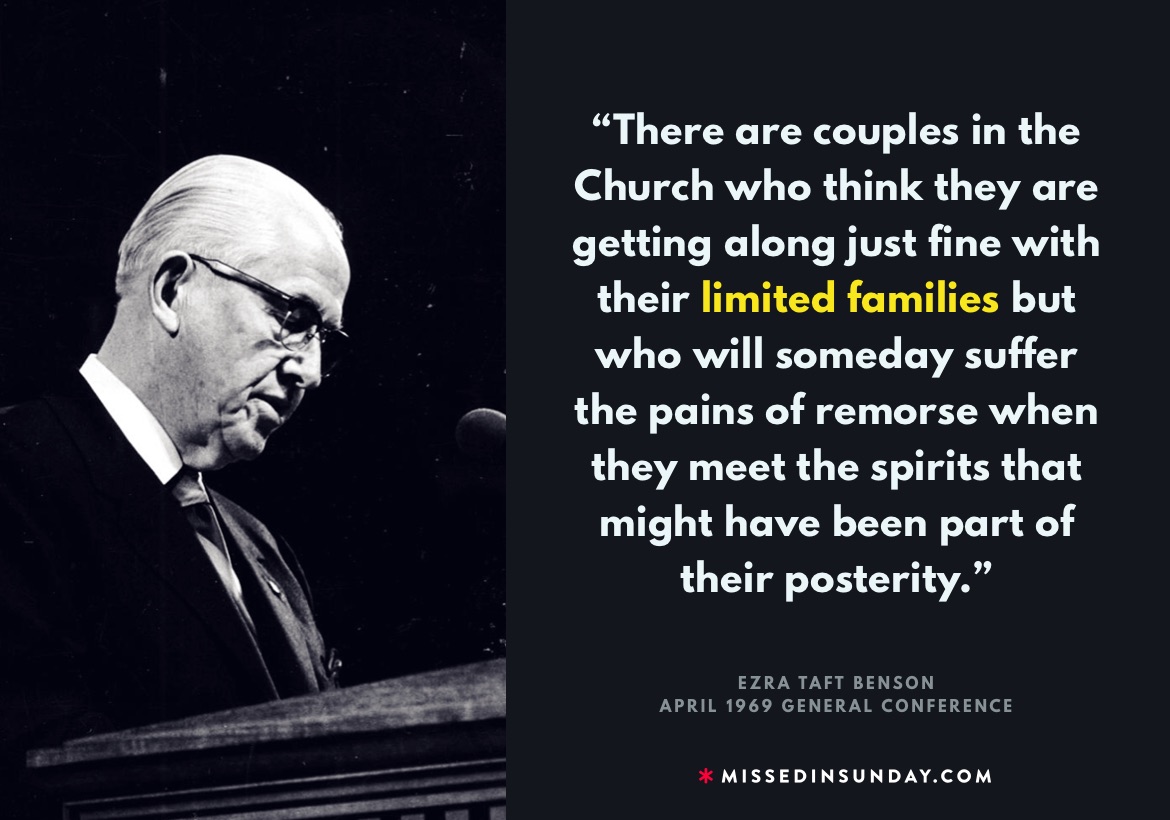
Limited Families
Excerpt from an April 1969 General Conference address by Ezra Taft Benson: 1
The world teaches birth control. Tragically, many of our sisters subscribe to its pills and practices when they could easily provide earthly tabernacles for more of our Father’s children. We know that every spirit assigned to this earth will come, whether through us or someone else. There are couples in the Church who think they are getting along just fine with their limited families but who will someday suffer the pains of remorse when they meet the spirits that might have been part of their posterity. The first commandment given to man was to multiply and replenish the earth with children. That commandment has never been altered, modified, or cancelled. The Lord did not say to multiply and replenish the earth if it is convenient, or if you are wealthy, or after you have gotten your schooling, or when there is peace on earth, or until you have four children. The Bible says, “Lo, children are an heritage of the Lord: . . . Happy is the man that hath his quiver full of them. . .” (Ps. 127:3, 5.) We believe God is glorified by having numerous children and a program of perfection for them. So also will God glorify that husband and wife who have a large posterity and who have tried to raise them up in righteousness.
References
References 1 April 1969 General Conference – https://archive.org/details/conferencereport1969a/page/n65/mode/2up -
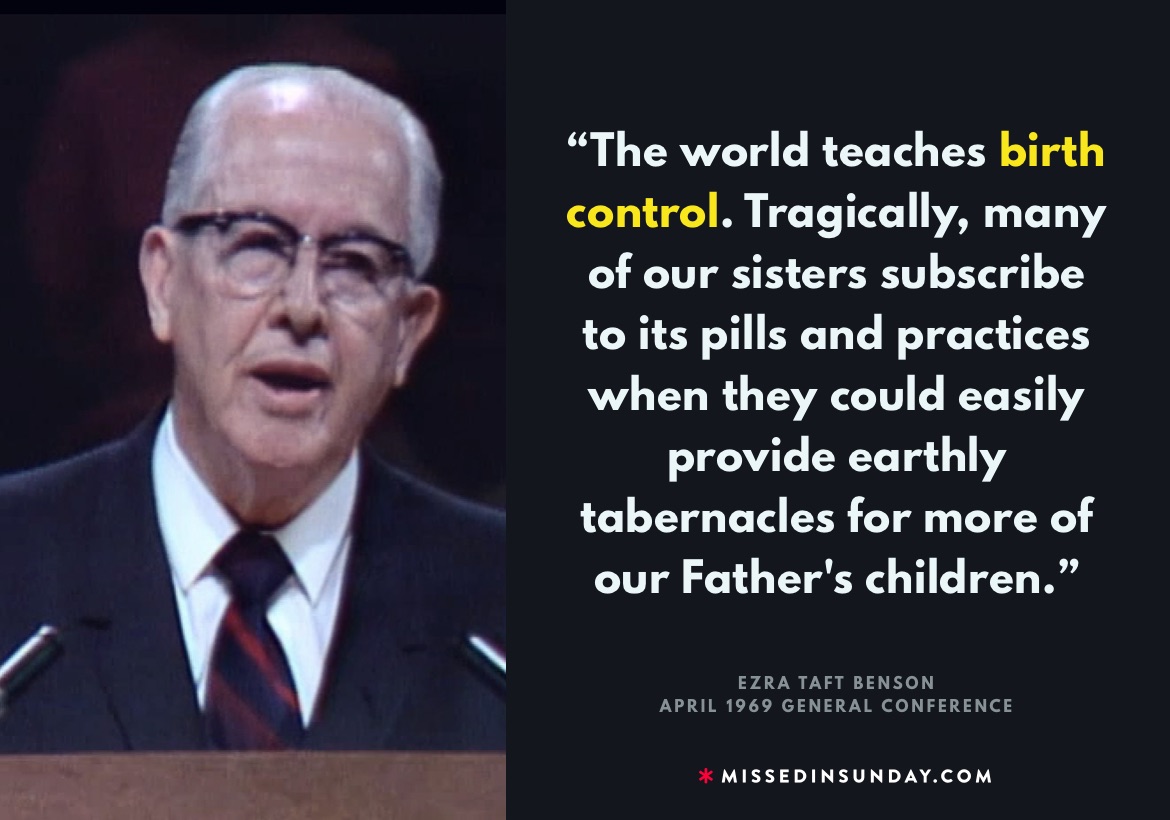
Pills and Practices
Excerpt from an April 1969 General Conference address by Ezra Taft Benson: 1
The world teaches birth control. Tragically, many of our sisters subscribe to its pills and practices when they could easily provide earthly tabernacles for more of our Father’s children. We know that every spirit assigned to this earth will come, whether through us or someone else. There are couples in the Church who think they are getting along just fine with their limited families but who will someday suffer the pains of remorse when they meet the spirits that might have been part of their posterity. The first commandment given to man was to multiply and replenish the earth with children. That commandment has never been altered, modified, or cancelled. The Lord did not say to multiply and replenish the earth if it is convenient, or if you are wealthy, or after you have gotten your schooling, or when there is peace on earth, or until you have four children. The Bible says, “Lo, children are an heritage of the Lord: . . . Happy is the man that hath his quiver full of them. . .” (Ps. 127:3, 5.) We believe God is glorified by having numerous children and a program of perfection for them. So also will God glorify that husband and wife who have a large posterity and who have tried to raise them up in righteousness.
References
References 1 April 1969 General Conference – https://archive.org/details/conferencereport1969a/page/n65/mode/2up -
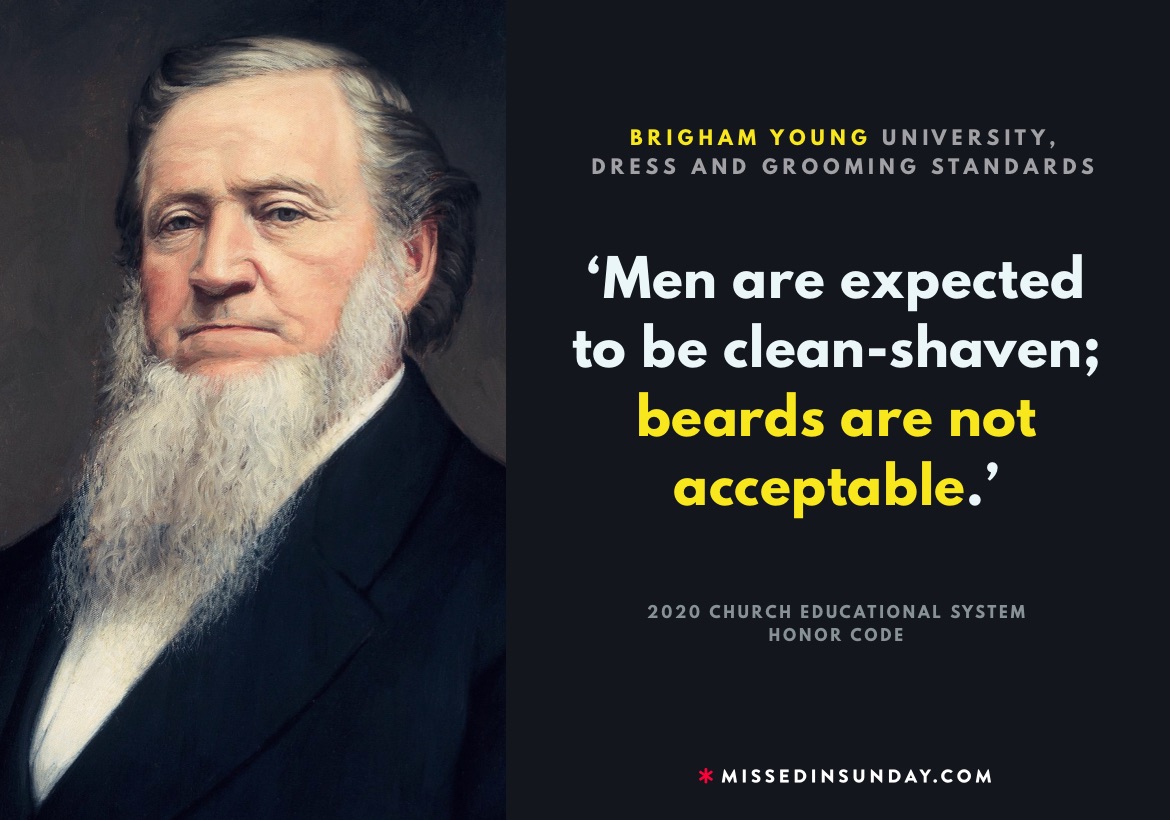
Beards
Church Educational System Honor Code, 2020: 1
Dress and Grooming Standards
The dress and grooming of both men and women should always be modest, neat, and clean, consistent with the dignity adherent to representing The Church of Jesus Christ of Latter-day Saints and any of its institutions of higher education.
Modesty and cleanliness are important values that reflect personal dignity and integrity, through which students, staff, and faculty represent the principles and standards of the Church. Members of the BYU community commit themselves to observe the following standards, which reflect the direction of the Board of Trustees and the Church publication For the Strength of Youth. The Dress and Grooming Standards are as follows:
Men
A clean and well-cared-for appearance should be maintained. Clothing is inappropriate when it is sleeveless, revealing, or form fitting. Shorts must be knee-length or longer. Hairstyles should be clean and neat, avoiding extreme styles or colors, and trimmed above the collar, leaving the ear uncovered. Sideburns should not extend below the earlobe or onto the cheek. If worn, moustaches should be neatly trimmed and may not extend beyond or below the corners of the mouth. Men are expected to be clean-shaven; beards are not acceptable. Earrings and other body piercing are not acceptable. Shoes should be worn in all public campus areas.
Women
A clean and well-cared-for appearance should be maintained. Clothing is inappropriate when it is sleeveless, strapless, backless, or revealing; has slits above the knee; or is form fitting. Dresses, skirts, and shorts must be knee-length or longer. Hairstyles should be clean and neat, avoiding extremes in styles or colors. Excessive ear piercing (more than one per ear) and all other body piercing are not acceptable. Shoes should be worn in all public campus areas.
References
References 1 Church Educational System Honor Code, 2020 – https://policy.byu.edu/view/index.php?p=26 -

Vainest City
Fox 13 News, February 24, 2016:1
“Forbes Magazine ranked Salt Lake City as “America’s vainest city” in 2007. With nearly six plastic surgeons for every 100,000 people, that’s 2.5 times the national average.”
Excerpt from a 2007 Forbes article, America’s Vainest Cities: 2
As the number of cosmetic procedures nationwide continues to surge, we looked at which cities have most embraced market demand for taut faces, lush lips and flat abs. There were predictable entries like New York, Miami and Los Angeles, but also surprising ones like Louisville, Ky., and Nashville, Tenn. Most shocking of all was the town that ranked first: Salt Lake City.
True to the Faith, A Gospel Reference, pub. 2004:3
Tattooing
Latter-day prophets strongly discourage the tattooing of the body. Those who disregard this counsel show a lack of respect for themselves and for God. The Apostle Paul taught of the significance of our bodies and the danger of purposefully defiling them: “Know ye not that ye are the temple of God, and that the Spirit of God dwelleth in you? If any man defile the temple of God, him shall God destroy; for the temple of God is holy, which temple ye are” (1 Corinthians 3:16–17).
If you have a tattoo, you wear a constant reminder of a mistake you have made. You might consider having it removed.
Body Piercing
Latter-day prophets strongly discourage the piercing of the body except for medical purposes. If girls or women desire to have their ears pierced, they are encouraged to wear only one pair of modest earrings.
Those who choose to disregard this counsel show a lack of respect for themselves and for God. They will someday regret their decision.
The Apostle Paul taught of the significance of our bodies and the danger of purposefully defiling them: “Know ye not that ye are the temple of God, and that the Spirit of God dwelleth in you? If any man defile the temple of God, him shall God destroy; for the temple of God is holy, which temple ye are” (1 Corinthians 3:16–17).
References
References 1 Vain Utah: Cosmetic surgery more popular than ever in the Beehive State – https://fox13now.com/2016/02/24/vain-utah-cosmetic-surgery-more-popular-than-ever-in-the-beehive-state/ 2 America’s Vainest Cities – https://www.forbes.com/2007/11/29/plastic-health-surgery-forbeslife-cx_rr_1129health.html#41ee6fe64dec 3 True to the Faith – https://www.churchofjesuschrist.org/study/manual/true-to-the-faith?lang=eng -
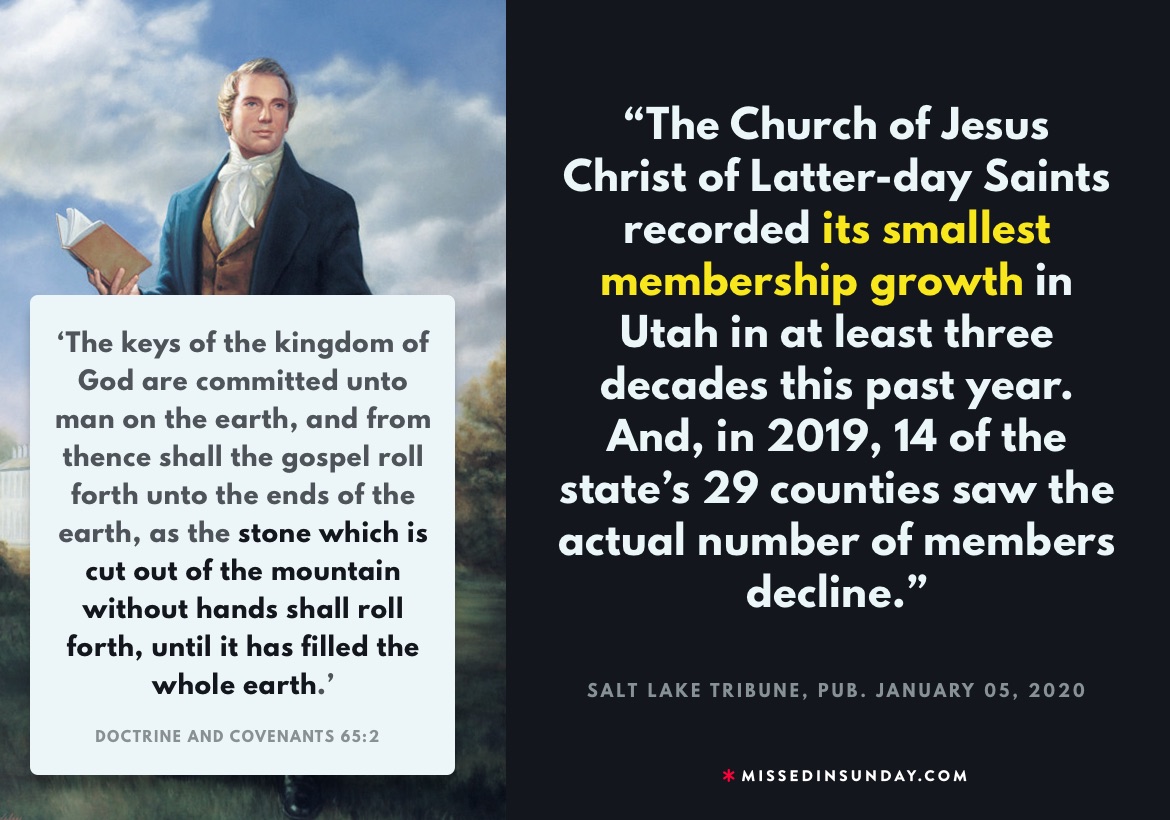
Stone Cut Out of the Mountain
Excerpt from a Salt lake Tribune article, published January 05, 2020: 1
The Church of Jesus Christ of Latter-day Saints recorded its smallest membership growth in Utah in at least three decades this past year. And, in 2019, 14 of the state’s 29 counties saw the actual number of members decline.
Doctrine and covenants 65:2 2
2 The keys of the kingdom of God are committed unto man on the earth, and from thence shall the gospel roll forth unto the ends of the earth, as the stone which is cut out of the mountain without hands shall roll forth, until it has filled the whole earth.
Additional resources:
http://ldschurchgrowth.blogspot.com/
References
References 1 Utah sees Latter-day Saint slowdown and membership numbers drop in Salt Lake County – https://www.sltrib.com/religion/2020/01/05/utah-sees-latter-day/ 2 Doctrine and covenants 65:2 – https://www.churchofjesuschrist.org/study/scriptures/dc-testament/dc/65?lang=eng -
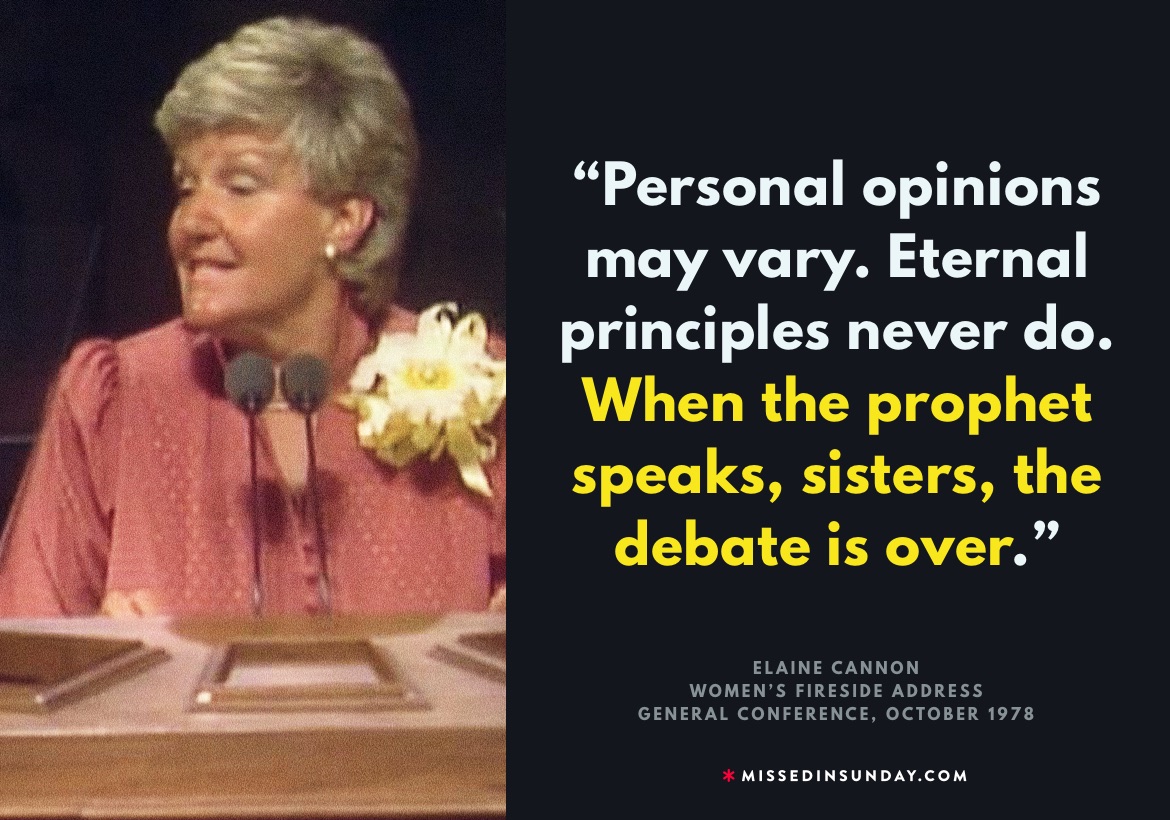
The Debate is Over Sisters
Excerpt from a Women’s Fireside Address, General Conference, October 1978, ‘If We Want to Go Up, We Have to Get On’, Elaine Cannon: 1
Though we are women with different cultural backgrounds clear across the span of my voice, some with varying differences in personal situations (we may even clash at times on opinions regarding temporal trends or how to bake a loaf of bread properly), my firm feeling is that we must pursue a course of a covenant people. We must secure those traditions which are sacred to good people everywhere. In each country as you hear this program by direct line, your course should become clear, your priorities ought to be known to you as a daughter of God. Personal opinions may vary. Eternal principles never do. When the prophet speaks, sisters, the debate is over. So I urge us all to provide powerful unity as women for those things we can agree upon—family, chastity, accountability to the Lord, responsibility in the community, sharing the gospel. To help us, it seems there are at least two critical areas to concentrate on—for all of us of all ages, whether we are whole or lame, at peace or troubled, privileged or seemingly deprived. The first is to strengthen self. The second is to serve the Lord by serving others. This is the way it works: We gain a personal testimony. We share it with others. We learn the principles of the gospel. We apply them as we associate with others. We keep a personal record, and we do our genealogy. And, sisters, we emphatically and happily declare, “I will be obedient! I will help strengthen others that they may be so too!”
Additional study:
14 Fundamentals in Falsifying the Prophet – https://rationalfaiths.com/fourteen-fundamentals-falsifying-prophet/
References
References 1 General Conference, October 1978, ‘If We Want to Go Up, We Have to Get On’, Elaine Cannon – https://www.churchofjesuschrist.org/study/ensign/1978/11/if-we-want-to-go-up-we-have-to-get-on?lang=eng -

The Debate is Over
Excerpt from a First Presidency Message, August 1979, Ensign, N. Eldon Tanner (First Counselor in the Presidency): 1
“We must turn all this about. We cannot serve God and mammon. Whose side are we on? When the prophet speaks the debate is over.”
Additional study:
14 Fundamentals in Falsifying the Prophet – https://rationalfaiths.com/fourteen-fundamentals-falsifying-prophet/
References
References 1 First Presidency Message, August 1979, Ensign – https://www.churchofjesuschrist.org/study/ensign/1979/08/the-debate-is-over?lang=eng -
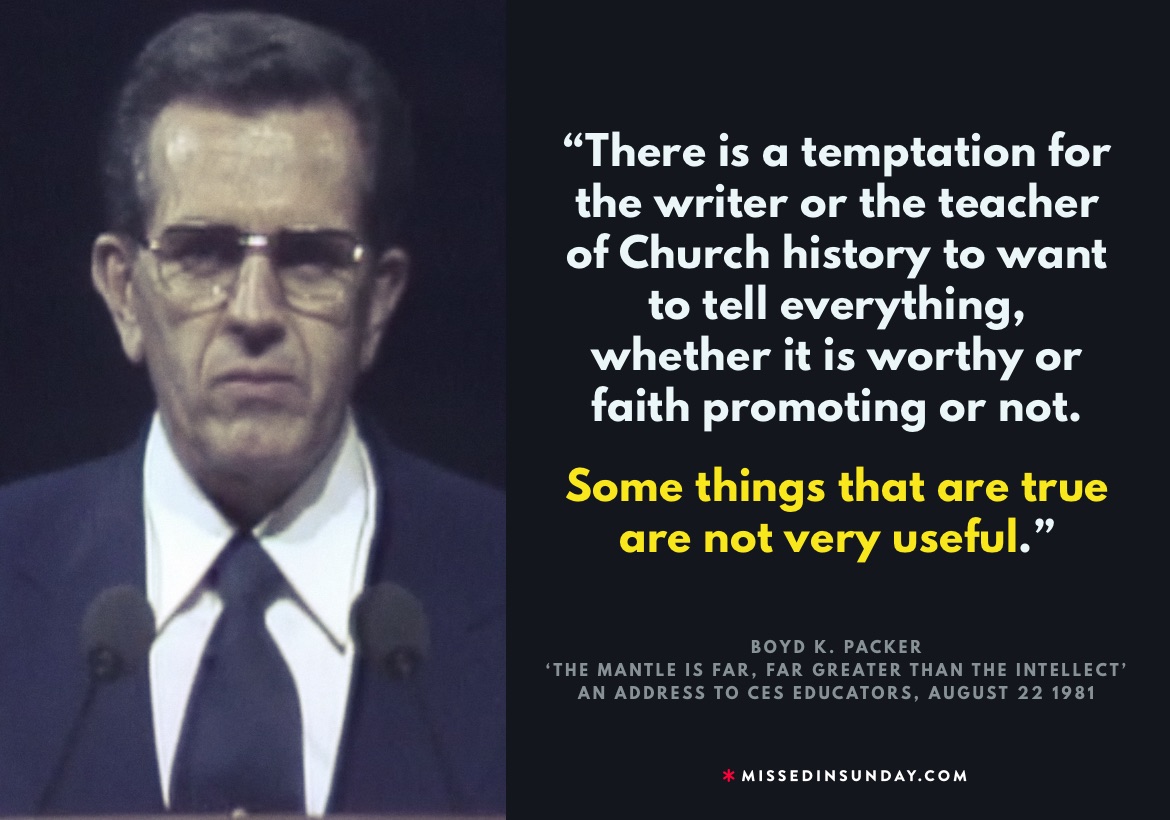
Truth
Excerpts from an address by Boyd K. Packer, ‘The Mantle Is Far, Far Greater Than the Intellect’, to religious educators on 22 August 1981: 1
It is an easy thing for a man with extensive academic training to mea- sure the Church using the principles he has been taught in his professional training as his standard. In my mind it ought to be the other way around. A member of the Church ought always, particularly if he is pursuing extensive academic studies, to judge the professions of man against the revealed word of the Lord.
:::
You seminary teachers and some of you institute and BYU men will be teaching the history of the Church this school year. This is an unparalleled opportunity in the lives of your students to increase their faith and testi- mony of the divinity of this work. Your objective should be that they will see the hand of the Lord in every hour and every moment of the Church from its beginning till now.
:::
Church his- tory can be so interesting and so inspiring as to be a very powerful tool indeed for building faith. If not properly written or properly taught, it may be a faith destroyer.
:::
There is a temptation for the writer or the teacher of Church history to want to tell everything, whether it is worthy or faith promoting or not. Some things that are true are not very useful.
:::
That historian or scholar who delights in pointing out the weaknesses and frailties of present or past leaders destroys faith. A destroyer of faith— particularly one within the Church, and more particularly one who is employed specifically to build faith—places himself in great spiritual jeopardy. He is serving the wrong master, and unless he repents, he will not be among the faithful in the eternities.
:::
One who chooses to follow the tenets of his profession, regardless of how they may injure the Church or destroy the faith of those not ready for “advanced history,” is himself in spiritual jeopardy. If that one is a member of the Church, he has broken his covenants and will be accountable. After all of the tomorrows of mortality have been finished, he will not stand where he might have stood.
:::
Those who have carefully purged their work of any religious faith in the name of academic freedom or so-called honesty ought not expect to be accommodated in their researches or to be paid by the Church to do it.
:::
Remember: when you see the bitter apostate, you do not see only an absence of light, you see also the presence of darkness.
Do not spread disease germs!
References
References 1 The Mantle Is Far, Far Greater Than the Intellect, Boyd K. Packer – https://www.churchofjesuschrist.org/study/manual/teaching-seminary-preservice-readings-religion-370-471-and-475/the-mantle-is-far-far-greater-than-the-intellect?lang=eng

